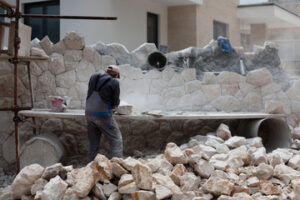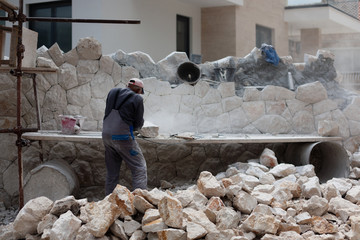Stone Mason Charleston SC builds and repairs structures using a wide range of stones, including igneous, metamorphic, and sedimentary. They use a combination of art and science to sculpt stones into shapes that fit together like a jigsaw puzzle.
They also install stone components on construction sites, including walls, arches, and chimneys. Masons fill in joints with mortar, which they apply with a trowel.
Stone masons work with a variety of materials to create buildings, sculptures, and other structures. They use their knowledge of different types of stones to determine how to best make a structure last for years and look aesthetically pleasing. This is a highly demanding job that requires physical strength and manual dexterity, as well as an eye for detail.
Some of the job duties that stone masons do on a daily basis include:
Reviewing plans and blueprints: Before starting their day, stone masons spend time reviewing architectural plans for the project they’re working on in order to ensure they understand the specific requirements for the structure they are building. Using the plans, they are able to figure out the amount of material required and plan their construction accordingly.
Polishing stone by hand: Stone masons spend part of their day using a handheld stone tool to manually chisel away pieces of stone that have been cut or broken. This is an important aspect of their work because it allows them to shape and smooth the surface of the stone so that it can be used in the construction of the final structure.
Operate a pneumatic chisel: When required, stone masons also operate a pneumatic chisel to remove material from a stone workpiece. This can be a very dangerous operation, so it’s critical that stone masons are skilled and familiar with the proper use of this equipment.
Inspecting and cleaning their tools: Stone masons must regularly inspect their own and their colleagues’ tools for wear and tear and to make sure they are in good working condition. In addition, they may need to clean up their work area and put away any tools that have been used or are no longer needed for the next day’s work.
In order to do their job effectively, stone masons need to have strong communication skills. They must be able to listen carefully to instructions from their supervisors, and they need to communicate with other members of the construction crew to coordinate work activities. They must also be able to read and interpret blueprints.
Education and training requirements
Whether working on a building project or carving intricate stone sculptures, a stone mason needs to possess certain skills and expertise. These skills are developed through training and on-the-job experience, which can be gained in a variety of ways. Some choose to pursue a formal education in the field, while others opt for a more hands-on approach to learning the trade. The Bureau of Labor Statistics reports that most brick and block masons gain their major skills and knowledge through an apprenticeship program. These programs usually last three years and include classroom education as well as on-the-job training. Apprentices work as helpers under an experienced mason while receiving instruction in subjects such as blueprint reading and mathematics.
Individuals who enjoy this career often have strong, realistic interests. These are a type of personality trait that relates to a person’s preferences for concrete, hands-on problems and solutions. Other job-related interests may include technical, interpersonal, and creative.
Stone masons who want to improve their skill set can take a course offered by the International Masonry Institute (IMI). This certification program offers a comprehensive overview of the fundamentals of masonry, including cutting and shaping, installing, and repairing. The program also covers a wide range of topics related to the preservation and restoration of historic stone structures.
Other types of training available for aspiring stone masons include short courses. These can be found through online or local college offerings and are designed to introduce learners to specific techniques. Those who are interested in the field can also seek out internship opportunities to gain valuable on-the-job experience.
While a high school diploma is not required for most positions, it is helpful to have one for the purpose of applying for an apprenticeship or other job-training program. A high school education also provides learners with the necessary background information and mathematical skills needed to be successful in this occupation. Local union offices and trade associations can provide more information about apprenticeship training options in the area. Some community colleges also offer a 1-year program in basic masons’ skills.
Working Conditions
Stonemasons work outdoors on construction sites, which can be noisy and dusty. They also often lift heavy objects and work in inclement weather. For this reason, stone masons need to be physically strong and able to handle difficult manual tasks for extended periods of time. They should also be able to read and understand construction blueprints.
Most stonemasons train through a three-year apprenticeship sponsored by labor unions or trade associations. The apprenticeship includes on-the-job training as well as classroom instruction in blueprint reading, mathematics, layout work, and sketching. The apprenticeship program is usually accompanied by classes in safety and the use of tools.
Once qualified, a stonemason can either start his or her own business or find employment with a construction company or general contractor. Some also choose to work for government agencies to construct public buildings or monuments. Other stonemasons choose to focus on repair and restoration work. Masons in this latter field can find jobs with private clients, including homeowners who wish to restore their property’s traditional look.
Those who specialize in working with marble must have special skills to properly set the material, which is very slippery and can easily break or chip if not handled correctly. They also must be familiar with the proper techniques for laying marble flooring. Some stone masons work with derrick operators who run hoists to move large stone blocks into place on construction sites.
Some stonemasons also focus on carving. They may create a statue or other piece of decorative stone for sale to the public, as well as provide carving services for companies that specialize in building and home design. Other stonemasons may work for funeral homes or cemeteries to carve headstones.
Some stonemasons focus on precasting masonry components, which can reduce overall costs for a project. They can also perform post-tensioning, a method of strengthening concrete or other structural materials by threading steel tendons through ducts in the stone or along its surface. These tendons are then tensioned using hydraulic jacks, which improves the stone’s ability to resist tensile stresses that could otherwise cause cracking or failure.
Job Outlook
The job outlook for a stone mason is good due to the constant demand for building materials. There are several routes to becoming a stone mason, such as completing a college course, taking an apprenticeship, or training on the job. Employers will look at a candidate’s enthusiasm and willingness to learn, along with their practical skills. Masons can work with natural stones, including marble and granite, as well as engineered stone and concrete.
Most stonemasons work in the construction industry, though some are self-employed contractors and freelance artists. Others work for rock quarries, cemeteries, and headstone manufacturers. Masons also repair or re-carve existing structures, including those that are historically significant.
Masons may also use single-application specialized fixings and simple cramps and dowels to make the work more efficient. They may also use electric abrasive tools and gasoline-powered saws to cut through stone more efficiently than traditional methods. The physical demands of the job can be difficult for the average person, as masons often spend long periods of time on scaffolding or ladders in poor weather.
In some cases, masons may need to operate and maintain heavy machinery, which can be dangerous if not properly trained and operated. Masons are required to follow strict workplace safety standards as set out by the Occupational Health and Safety Administration. They also need to adhere to expansive instructions from architects and engineers.
A good-quality stone mason can earn around £29,000 per year, based on experience and location. Apprentices will start at around £20,000. This figure includes the basic wage, overtime, and any additional allowances. Self-employed masons are likely to earn more than those working full-time.
Brick masons and block masons are expected to see faster job growth than the average occupation due to population growth and a preference for low-maintenance exteriors that are long-lasting and sturdy. Masons can also find opportunities to restore older buildings as more homeowners opt for brick exteriors instead of more expensive and high-maintenance alternatives.
